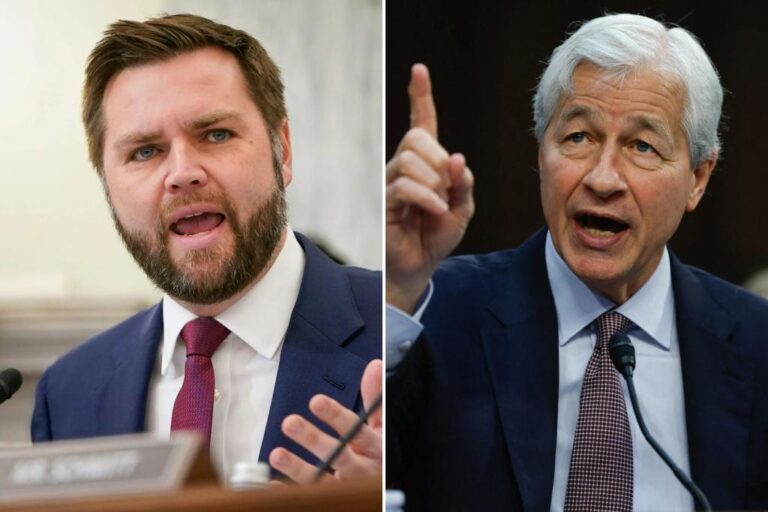JD Vance did more than shake up the presidential election – he shook up Wall Street, and maybe Silicon Valley, too.
With polls showing Trump’s chances of winning the presidency growing, sources told On The Money that just hours after the Ohio senator was selected as Trump’s running mate, analysts began holding conference calls with clients – big investors, big corporations, etc. – about the potential impact of his vice presidential pick on policy.
For starters, Vance’s reputation as an ardent populist combined with his intellectual prowess and knowledge of economic and financial policy has many top Wall Street officials confident that he will have a say in Trump’s economic agenda.
One source — an attorney at a major Washington, D.C.-based firm — said it’s not just a trade war. It’s going to be about reining in the power of Big Tech. You can see the Trump-Vance FCC rethinking Section 230 of the Communications Decency Act, the legal shield that allows all social media to operate without fear of liability for the content it publishes.
Losing that shield could be disastrous for companies like Facebook and even Twitter. Vance could lead an effort to use FCC rules to weaken some of that shield, something that was debated during the waning years of Trump’s first term when Twitter restricted and in some cases banned conservative voices.
Of course, that was before Elon had Twitter, and then Trump, so it’s unclear how willing the new Trump-Vance GOP is to grapple with a platform now open to MAGA votes. But it’s still a possibility if they make it to the White House.
Vance has also had oddly favorable things to say about Lina Khan, the left-leaning head of the Federal Trade Commission and anathema to conservative economic commentators. She is known as an Ivy League academic who has argued about the evils of online retailer Amazon exercising monopolistic control. She feels the same way about Google, and if she had her choice, she would break up the two on antitrust grounds (she has filed lawsuits against both companies).
I’m not sure Vance wants to go that far, but it’s another thing to consider in the equation if he’s elected.
Vance has railed against corporations getting tax breaks, even as Trump is now pushing for new corporate tax cuts. That’s why another legal source who worked in the Trump White House told me Vance may opt for some easy populist measures targeting the private equity industry.
Vance, he said, could eliminate a tax loophole he favors, the so-called carried interest deduction that allows PE firm managers to earn a lower tax rate on money earned by their portfolio companies than the rate for regular income.
This is highly controversial, although PE lobby groups have successfully fought efforts to end it even during the Trump administration, arguing, not unconvincingly, that it would be very bad for the economy. Without those benefits, PE firms would not invest in and try to fix the companies they take private, which can sometimes take years to fix.
Vance hasn’t said much about the carried interest controversy, and perhaps for good reason: During his VC days, he may have made a lot of money exploiting that legal loophole, but that was when he was a Reagan-supporting Republican, not a MAGA-supporting Republican.
“It’s easy for him to push for it to be removed and score points with populists on both the left and the right because they think the interest rates are unfair,” my legal source said.
Others aren’t so sure. A PE government official said he’s not worried. “JD has bigger issues to solve,” he said. And one of the big ones is energy policy. Vance wants more drilling, my source said, and he’ll certainly push for fewer green energy measures from a Biden administration. The electric vehicle tax credit could also be eliminated if he had his way.
And he hates corporate conscience. During a Senate banking committee hearing in December, he slammed big bank executives including JP Morgan’s Jamie Dimon and Bank of America’s Brian Moynihan for wading into political debates, touting progressive issues on the environment, guns, abortion, including their support for Environmental Social Governance investing, which he said has led to less drilling and higher gas prices for average Americans.
“Don’t interfere in public policy unless it affects your core business interests, because otherwise it’s much harder for us to see you as an arbiter and a neutral player in the American financial system. It’s much easier for us to see you as a political player,” Vance told Wall Street’s top brass.
Before the banking lobby starts attacking him, consider this: The Vance effect wouldn’t be all bad for Wall Street. Overall, a Trump-Vance administration would be much better for Wall Street M&A, which is a landmine of regulatory failures with Biden’s people in charge where almost no deals can get done.
If elected, Trump II with Vance by his side would be fascinating, so get your popcorn ready.


